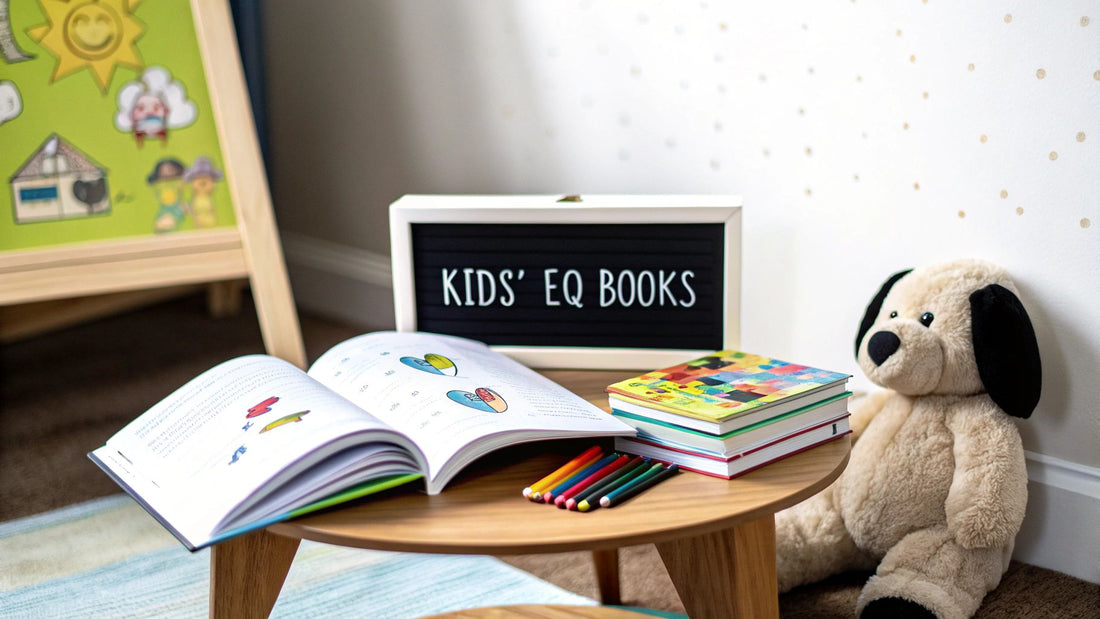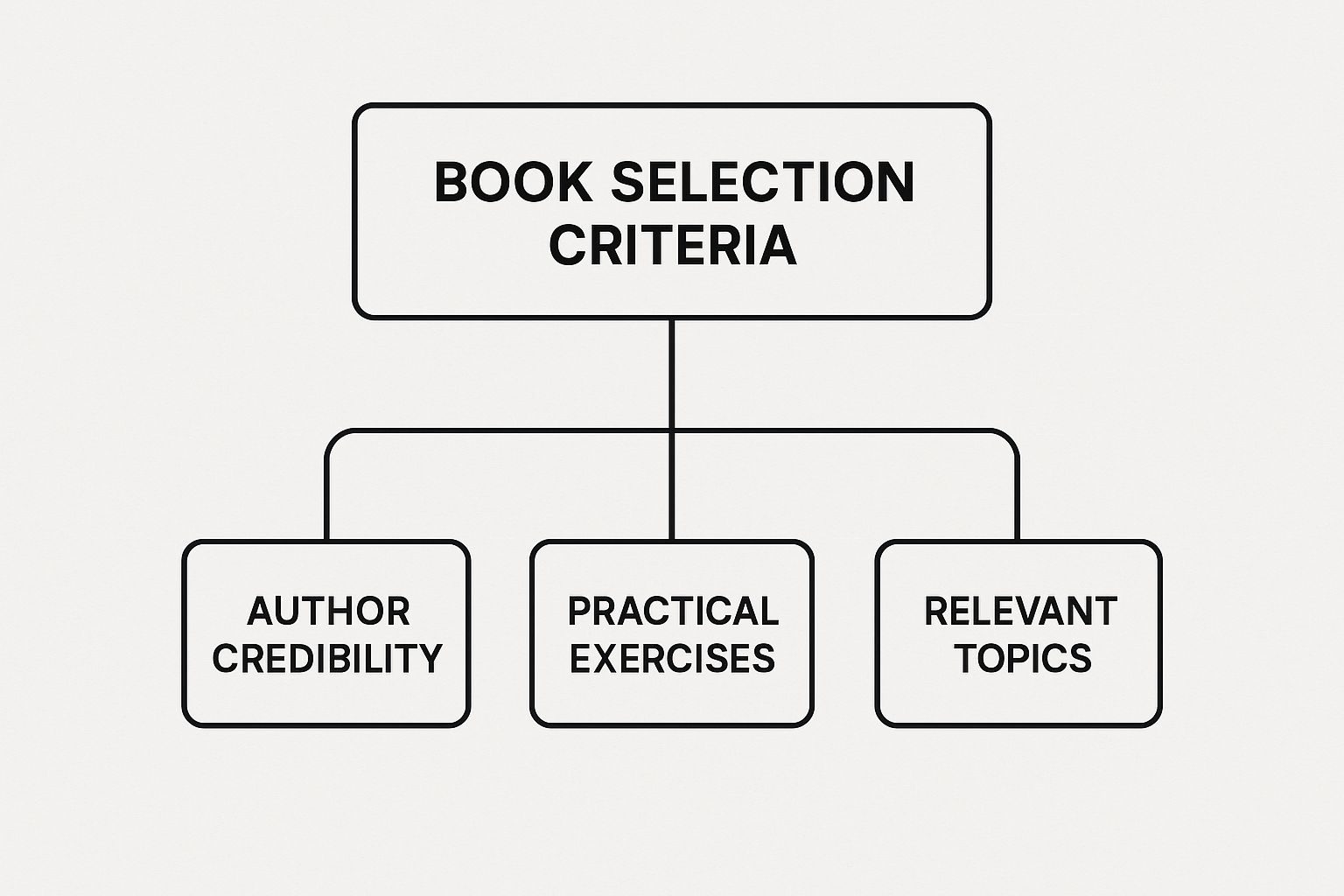
Top Books About Emotional Intelligence for Kids | Enhance Skills
Share
Finding the right books about emotional intelligence can feel like you’re giving your child a secret superpower. These stories offer so much more than entertainment; they’re the building blocks children need to make sense of their complex inner worlds and build strong, healthy relationships for life.
Why Emotional Intelligence Is a Superpower for Kids
In a world buzzing with digital distractions and the pressures of social media, looking after a child's mental health has never been more vital. Emotional intelligence (often called EQ) is simply the ability to recognise, understand, and manage our own emotions—and to spot, understand, and influence the emotions of others. For kids, this isn't some lofty, abstract idea; it's a practical, everyday skill.
Think of it as the tool that helps a child bounce back from a playground disagreement or show genuine care when a friend is upset. It’s the quiet confidence to say, "I'm feeling sad," instead of lashing out in frustration. Getting a handle on these skills early is absolutely critical. The World Health Organisation reports that half of all mental health conditions start by age 14, which makes childhood a crucial window to build a strong foundation.
Building an Emotional Vocabulary
The first step on this journey is developing what experts call emotional literacy. You can dive deeper into what is emotional literacy in our detailed guide, but at its heart, it’s about giving children the words to match their feelings. It helps turn a confusing storm of emotions into something they can actually name and understand.
This "emotional vocabulary" acts like a protective shield, helping to foster resilience and healthy ways of coping. It also lays the groundwork for empathy, a huge part of being socially aware. When a child can put a name to their own feelings, they’re far better equipped to understand what someone else might be going through. This crucial connection starts incredibly early, which just goes to show the importance of nurturing a baby's social development from day one.
Emotional intelligence is critical in building and maintaining relationships and influencing others—key skills that help people throughout their career and wherever they sit in an organisational structure.
Practical Benefits in Daily Life
For children, a healthy EQ translates into real, tangible benefits that support their overall wellbeing. Some of these everyday advantages include:
- Better Conflict Resolution: A child with high EQ might say, "I felt sad when you took my toy without asking," instead of just snatching it back. This helps them navigate disagreements constructively.
- Improved Focus at School: Less emotional turmoil means more mental space for learning. For example, a child who can name their anxiety before a test can use a calming technique, like deep breathing, to help them concentrate.
- Stronger Friendships: Empathy and social skills are the glue that helps them build and keep supportive friendships. They learn to notice when a friend is feeling left out and can take steps to include them.
Equipping children with these foundational skills is just as important as teaching them to read or count. It's a true investment in their lifelong mental wellbeing and future success. Simple things, like teaching them deep breathing before a test or even letting them wear comfy mental health apparel to feel secure, are all practical ways we can support this journey.
A quick but important note: I am not a mental health professional. The information shared here is purely for educational purposes. If you have any concerns about your child's wellbeing, please seek help from a doctor or a qualified specialist.
How Stories Build Stronger Emotional Foundations

So, why are books such a magical tool for teaching emotional skills? At their heart, stories are a safe playground for the mind. They let children explore big, complicated feelings like jealousy, frustration, or loss, all through the eyes of a character they can relate to. This is absolutely essential for their developing mental health.
Think about it. When a child reads about a nervous little squirrel getting ready for its first day of school, it opens the door for a real conversation about their own worries. This shared experience creates a unique chance to bond, giving them the words and the context they need to name and understand what’s going on inside.
This focus on emotional wellbeing isn't just a passing parenting trend; it reflects a much bigger shift in how we think. The UK market for social and emotional learning (SEL), which includes things like books about emotional intelligence, is tipped to hit roughly US$706 million by 2030. This shows that educational bodies and investors really are recognising how critical these skills are. You can get a deeper look into the growth of the SEL market on Grandview Research.
Making Abstract Feelings Concrete
Stories have this special knack for turning abstract ideas like empathy and perseverance into something tangible. For a young child, "empathy" is just a word. But watching a character share their favourite toy with a friend who’s feeling sad? That makes the concept real. They get it.
These narratives also provide a low-stakes way to see cause and effect in action. A child can see what happens when a character tells a fib or loses their temper, learning valuable social lessons without having to go through the negative consequences themselves. This is how they start to build a sturdy emotional foundation, one page at a time.
Reading stories from other people’s perspectives helps us gain insight into their thoughts, motivations, and actions and may help enhance your social awareness.
This kind of learning-by-watching is incredibly powerful for developing key emotional skills. It helps prepare children for the real-world situations they’ll eventually face.
The Lasting Impact of Shared Stories
The benefits of reading together stretch far beyond the final page. That quiet ritual of storytime can be a powerful way to unwind, signalling to a child that they are safe, loved, and cared for. In our non-stop world, that dedicated time for connection is priceless.
And the impact doesn’t stop there; it ripples out into the wider economy. Poor mental health costs UK businesses up to a staggering £56 billion a year because of staff absence and lower productivity. By nurturing emotional intelligence in childhood, we're not just raising happier kids; we're investing in a healthier, more resilient workforce for the future. Reading these stories helps children build coping mechanisms and emotional regulation skills that will serve them for a lifetime, lightening the long-term load on mental health services and creating more empathetic communities.
Choosing the Right Book for Your Child's Age
Not all books about feelings are created equal, and picking the right one is crucial if you want it to truly connect with your child. The trick is to match the story's complexity with their developmental stage. It’s a bit like teaching maths – you wouldn’t start with algebra for a toddler, and the same goes for emotional concepts. The message needs to land just right.
For toddlers aged 2-4, the whole world of emotions is brand new territory. The best books for this age group focus on simple, beautifully illustrated stories that help them put a name to big, basic feelings like 'happy', 'sad', or 'angry'. Look for clear facial expressions and comforting, repetitive phrases. If you're looking for a good starting point, we have a helpful guide specifically on books about feelings for toddlers.
Navigating Early School Years and Beyond
Once children hit their early school years (ages 5-7), their social worlds suddenly get much bigger and more complicated. The right books can be a brilliant guide, helping them navigate new challenges like making friends, learning to share, and figuring out how to cooperate with others. Stories for this age can introduce slightly more complex feelings like jealousy, excitement, or those first-day-of-school nerves.
For older children (ages 8-10), books can start to explore even more sophisticated social situations. These stories might tackle themes of peer pressure, understanding empathy for people with different experiences, or coping with disappointment. The characters can be more fleshed out, which opens the door for deeper conversations about motives and consequences.
To help you get a feel for what makes a great book at each stage, I’ve put together a simple table.
Emotional Intelligence Book Guide by Age
Here's a quick guide to help you choose books that align with your child's developmental stage, focusing on the emotional themes and book features that will resonate most.
| Age Group | Key Emotional Themes | What to Look For in a Book |
|---|---|---|
| Toddlers (2-4) | Naming basic emotions (happy, sad, angry). Recognising feelings in self and others. | Simple language, bold illustrations with clear facial expressions, repetitive text, and sturdy board book format. |
| Early School Years (5-7) | Making friends, sharing, jealousy, empathy, dealing with losing, and managing frustration. | Relatable school or family scenarios, simple plots showing cause and effect, and characters who solve problems. |
| Older Children (8-10) | Peer pressure, resilience, managing disappointment, understanding different perspectives, and complex friendships. | More developed characters and plots, stories that explore moral dilemmas, and themes of personal growth. |
This table is just a starting point, of course. The most important thing is finding a story that sparks curiosity and connection for your child.
To help you select the best titles, the infographic below outlines the core criteria for choosing effective books about emotional intelligence.

This hierarchy shows that while relevant topics are crucial, considering the author's credibility and the inclusion of practical exercises ensures the book is a well-rounded, effective tool.
A Note on Seeking Professional Help
It’s really important for me to say that I am not a mental health professional. These mental health books are wonderful tools for opening up conversations and building emotional skills at home, but they are never a substitute for professional advice.
If you have serious worries about your child's mental health or behaviour, please speak to your GP or a qualified specialist. It is so important to address mental health concerns early, as this provides the best chance for positive long-term outcomes.
Seeking professional help is a proactive and loving step towards ensuring your child receives the best possible support. Addressing mental health concerns early is vital for long-term wellbeing.
When you're browsing for books, keep these practical tips in mind:
- Preview the Story: Give the book a quick read yourself first. Does the message align with your family’s values?
- Look for Diversity: Choose books that show a range of characters and experiences. This helps broaden your child's understanding and empathy for the world around them.
- Check for Conversation Starters: Many great books include questions or prompts at the end to help you get the chat started.
Ultimately, the best book is one that resonates with your child and opens the door to meaningful chats about their feelings and how they see the world.
Our Top Picks for Emotional Learning Books

Here at Little Fish Books, we're not just publishers; we’re a team of passionate creators dedicated to nurturing children's mental health. We thoughtfully design stories that act as gentle tools for parents, offering a natural springboard for those all-important conversations about feelings.
This selection isn't just a list. It's a peek into our collection, explaining the 'why' behind each book and how it can genuinely support your child's emotional growth.
We know that talking about mental health with kids can feel daunting. With the constant buzz of social media and everyday pressures, giving them resources to build emotional resilience has never been more critical. Social media can create unrealistic expectations and comparison, making it even more important to foster a strong sense of self-worth from a young age. Our books are much more than just stories; they are carefully crafted aids designed to walk alongside you on your parenting journey.
Little Bear's Big Feelings
This story follows a young bear who is learning to get to grips with big, sometimes overwhelming emotions like anger and frustration. The real takeaway is about spotting these feelings as they bubble up and finding healthy ways to let them out, rather than bottling them up or lashing out.
For parents, it’s a perfect, practical starting point for discussing how to manage tempers. You can chat about what it feels like when frustration builds, just like it did for Little Bear, and explore simple relaxation tips together, like taking deep breaths or finding a quiet space to calm down.
The Friendship Garden
In this gentle tale, two friends discover the art of listening and truly understanding each other's point of view. It tackles the subtle but vital skill of empathy, showing how simply hearing a friend can mend misunderstandings and make friendships stronger.
The story helps children see the value in pausing to think about how their actions might make others feel. It’s an ideal book for chatting about kindness and cooperation—skills that are essential for building healthy friendships on the playground and far beyond.
Each book in our collection is designed not just to be read, but to be experienced. They are invitations for connection, helping you and your child explore the world of emotions together in a safe and supportive way.
Sparkle's Brave Search
This one is all about building resilience and self-confidence. The main character, Sparkle, faces a challenge that seems way too big at first, but learns to find her inner strength and ask for help when she needs it. It's a powerful story about perseverance and having the courage to try, even when you're afraid.
The story naturally opens up conversations about facing fears and the importance of a positive mindset. It also gently introduces the idea that being brave doesn't mean you're never scared; it means you keep going anyway.
Disclaimer: It's really important to remember that I am not a mental health professional. The purpose of these books about emotional intelligence and our other resources, including our mental health apparel, is to support everyday emotional learning. If you are ever worried about your child's mental wellbeing, please seek guidance from your doctor or a qualified specialist.
Creating a Calm Reading and Relaxation Ritual
The true magic of a story really comes alive in the environment you create around it. When you turn reading time into a dedicated relaxation ritual, you can completely transform how your child absorbs the emotional lessons tucked away in the pages. It becomes more than just a book; it becomes a cornerstone of their mental health routine.
This is about so much more than just reading words on a page. It’s about building a cosy, predictable routine that signals safety and calm to their nervous system. Creating these moments of connection is absolutely vital, especially when you consider that recent figures show one in five children in the UK now have a probable mental health condition. This really highlights how much proactive support is needed at home.
As you start to build this serene reading environment into a bedtime routine, you might wonder if reading can help you fall asleep. It certainly can, and creating that calm, comforting space is the very first step.
Making Reading an Interactive Experience
To truly get the most out of books about emotional intelligence, the trick is to make the experience interactive. This is how children start to connect a story's themes to their own lives, which is a huge step in building both empathy and self-awareness.
Instead of just narrating the story, try pausing to ask gentle, open-ended questions. Something as simple as, "How do you think the little fox felt when he got lost?" or "What do you think the character could do to feel a bit better?" These little prompts encourage them to step into a character's shoes and explore big feelings from a safe distance.
By asking thoughtful questions, you’re not just reading a story; you are co-creating a space for emotional exploration and building a vocabulary for feelings that will last a lifetime.
Another powerful technique is to connect moments in the story back to your child's own life. You could say, "That reminds me of when you were so brave at the dentist. Look, the squirrel is being brave, too!" This validates their own experiences and gently reinforces those positive emotional behaviours we all want to see.
Simple Relaxation Techniques to Pair with Stories
Pairing stories with simple relaxation techniques can deepen that feeling of calm and make skills like emotional regulation much more tangible for a child. These are practical exercises that help them feel these concepts in their own bodies, not just hear about them.
Why not try adding these gentle exercises into your reading ritual?
- Mindful Breathing: Keep it playful. You could say, "Let's pretend to smell a flower, and then gently blow out a candle." Guide them through a few slow, deep breaths in and out.
- Sensory Comfort: Bring in some comforting sensory tools. Mental health apparel like a weighted lap pad or even just a super soft, cuddly hoodie can create a soothing physical experience that helps with focus and emotional regulation.
- Progressive Muscle Relaxation: Make a game out of tensing and relaxing different muscles. "Squeeze your hands into tight fists like you're holding lemons, and then... relax them! Feel how soft they are now."
- Audio Companions: For some kids, listening is just as powerful as reading from a book. It’s worth exploring how audiobooks and ebooks can help your child with reading as a way to mix things up and keep the routine fresh.
Please remember, I am not a mental health professional. These tips are intended for educational purposes only. If you are ever worried about your child's wellbeing, it is always best to seek help from your doctor or a qualified specialist.
When to Seek Professional Guidance
While books about emotional intelligence are fantastic, it’s so important to remember they are a support tool, not a substitute for professional medical advice. The guidance in this article comes from my own experience and research, but I want to be absolutely clear: I am not a mental health professional.
If you have serious concerns about your child's wellbeing or you’ve noticed persistent changes in their behaviour, the best thing you can do is consult your GP or a qualified child mental health specialist. That’s a crucial first step.
Reaching out for professional help is a sign of strength. It's a proactive, loving step that ensures your child gets the support they truly need. Normalising this process is key to fostering a healthy approach to mental wellness for life.
Seeking a diagnosis or support is never a sign of failure. It’s simply a responsible and caring action that puts your child's long-term health and happiness first. As a parent, your instinct is powerful—always trust it.
Of course. Here is the rewritten section, designed to sound like an experienced human expert, following the specific style and tone of the provided examples.
Your Questions Answered
Dipping your toes into the world of emotional intelligence with your child can feel a bit overwhelming, and it’s completely normal to have a few questions pop up. I’ve put together some simple, practical answers to the queries I hear most often from parents, hopefully giving you a bit more confidence on this wonderful journey.
It’s easy to feel like you’ve missed the boat or wonder when the ‘right’ time to start is. But honestly, it’s never too early. The sooner you start weaving these ideas into your daily life, the more naturally they’ll become a part of your child’s emotional toolkit.
At What Age Should I Start Reading These Books?
You can start introducing books about emotional intelligence from day one. Seriously! For babies and toddlers, it’s all about simple board books that put a name to basic feelings like 'happy' and 'sad', often with big, clear facial expressions to match. This early exposure helps build their first emotional words, laying a crucial foundation for their future mental health.
How Do I Handle Difficult Topics When We're Reading?
When a story touches on something tricky, the most important thing is to create a safe, open space for a chat. Really listen to what your child is saying without jumping in to judge. You can validate their feelings with simple phrases like, ‘That does sound pretty scary,’ or ‘I can see why that character felt so upset.’
Answer their questions as honestly as you can, but keep it simple and age-appropriate. Always, always end with reassurance and support. Your main aim here is to keep the lines of communication wide open, showing them that no feeling is too big or too scary to talk about. This open dialogue is so important, especially as they get older and have to navigate things like school pressures and social media.
Just remember: Your job isn't to have all the answers. It's to be a calm, supportive presence. This teaches children that it’s okay to be vulnerable and that asking for help is actually a sign of strength.
What if My Child Just Isn’t Interested in These Stories?
Whatever you do, don't force it. If a child isn't clicking with a certain book, pushing it on them is almost guaranteed to backfire. A much better approach is to let them lead. Let them choose the stories and topics that they are genuinely excited about.
You’d be surprised how often you can find powerful emotional lessons tucked away in almost any good story, even if it’s not an obvious 'feelings book'. You could also try different formats—graphic novels and audiobooks can be brilliant for engaging kids in a new way. The real goal is to make emotional learning feel like a natural, enjoyable part of your reading time together, not a chore.
At Little Fish Books, we pour our hearts into creating beautifully illustrated stories and resources designed to help you have these important conversations. Come and explore our collection of books, fun activities, and supportive mental health apparel to help nurture your child's emotional wellbeing.
Discover our full range at https://thatsokay.co.uk.
